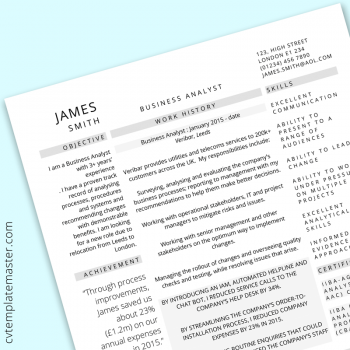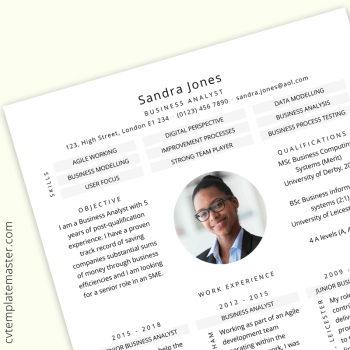How to write a business analyst CV
Writing a business analyst CV is a little different from writing CVs for other types of jobs. Employers expect you to demonstrate a range of skills and experience within the CV that are specific to this role.
In this guide, we’ll walk you step by step through how to write an effect CV for business analyst positions.
Use the job description
Your very first step is to analyse the job description and extract from it these three things that the employer is looking for:
- Qualifications
- Experience
- Skills
You will then demonstrate that you meet these requirements throughout your CV. It’s so important to tailor every CV you write to the job specification – because each employer has different requirements and one size most definitely does not fit all. Find out more about tailoring your CV to the role here.
Expand on the job description
If the job description isn’t particularly detailed, you may like to put together your own list of ‘must haves’ – as if you were the employer looking to recruit. An easy way to do this is to look at Prospects’ business analyst job profile and pick out the typical skills and requirements from there. For example, requisite skills include:
- Excellent communication skills
- Ability to present
- Ability to motivate others
- Ability to lead change
- Ability to work under pressure on multiple projects
- Ability to meet time frames / deadlines
- Passion for creating solutions
- Excellent analytical skills
- Evidence-based approach
- Passion for business and business development
- Good IT skills
Demonstrate skills
It’s not enough simply to list off any skills that the employer has included in the job advert. Instead, you need to demonstrate how you acquired a particular skill and when you’ve used it. This needs to run throughout your CV, from the personal statement right through to your interests section. To explain how, we’ll go through each core section step-by-step.
Business Analyst CV: step-by-step
The sections to include are:
- Name and contact details
- Personal statement
- Work history
- Education
- Skills (optional)
- Professional memberships (optional)
- Publications (optional)
- Hobbies and interests (optional)
- References
Name and contact info
Include your:
- Name
- Address
- Phone number(s)
- Email address
- Twitter and LinkedIn profiles
The latter are important because they help demonstrate that you’re interested in and involved with your industry. Read our guide to building a killer LinkedIn profile to complement your CV for more details.
Avoid including any information that may result in discrimination – read more on that here.
Personal statement
Sitting just underneath your name and contact information, the personal statement is one of the most important parts of a business analyst’s CV. Think of this short, snappy section as a ‘first impression’, and use it to convince recruiters in just a few lines why you’re perfect for the role. To help you, we’ll take a real-life business analyst job advert and write an example personal statement to fit:
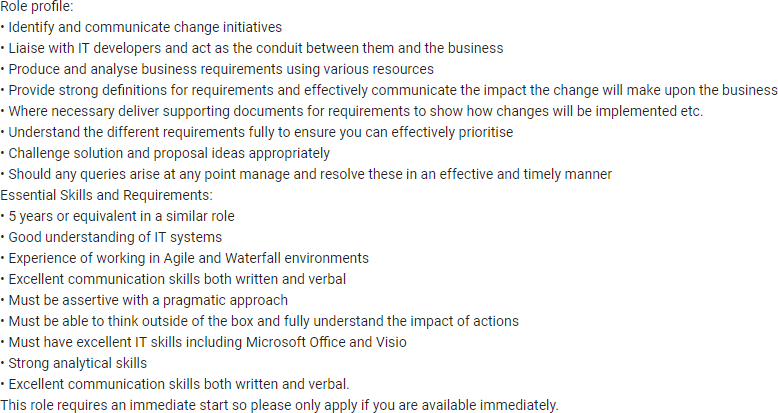
This is a fairly lengthy advert so you won’t get evidence every single requirement into your personal statement. For adverts like these, you’ll need to make some assumptions about is most important to the employer and then highlight this in your personal statement. The remaining attributes can be worked into your employment history and other areas of your CV. You’ll also need to take care not to simply list off the skills requested as anyone can do this. Instead, the employer will be looking for evidence in your application. You might write:
“I am a business analyst with 7 years’ experience in software development environments. I have introduced an extensive portfolio of change initiatives which have resulted in substantial cost savings and efficiencies for my employers, a synopsis of which I have attached. Using both Agile and Waterfall methodologies, I have liaised effectively between stakeholders and developers to find and develop effective solutions that deliver real results in line with business needs.”
Work history
Your work history should be written in reverse chronological order (most recent position first). For each position, give:
- Start and finish date
- Job title (if you’ve been given an obscure job title, feel free to change it to the mainstream equivalent – it’s better to do this in case the employer is using ATS software)
- Company name
- If it isn’t already obvious, a one line description of what the company does.
- Brief description of duties.
- Key achievements.
It can be tempting to include anything and everything you’ve ever done in your work history, but the key to gaining an interview is to resist that urge and focus.
Write your work history with the job advert in mind, giving examples of how you’ve gained and used the skills and experience requested. Give examples of projects you’ve worked on, results you’ve achieved and challenges you’ve overcome. Above all, ensure you provide evidence, rather than simply telling the employer you have what they’re looking for.
Education
Your education section should be presented with your highest qualification first, working downwards. If you have high level qualifications (e.g. Masters), you may decide to leave off lower level qualifications (e.g. GCSE) or summarise them with little detail (e.g. “9 GCSEs grade C and above”).
A range of degrees can be relevant to a business analyst role – for example, business information systems, business computing systems or history will all give you aspects of the skills the employer wants such as the ability to analyse data, use technology, work in groups and manage projects. Boost your application by highlighting any particular modules or projects you completed as part of the qualification that tie in with skills the employer wants.
Remember also that the employer may use software to scan your CV. You should therefore use the specific keywords mentioned in the job advert in relation to your qualifications. For example, if you have a BA in Business and the advert requests a BA in “Business with Marketing”, you could write underneath your degree title that this included a marketing module.
If you’ve attended training courses relevant to the position, you can list those here too.
Skills
You may feel that you’ve already covered skills sufficiently in other sections but if not, add anything you haven’t mention in here.
For hard skills, simply list off the skill with the level of proficiency e.g. “Microsoft Excel – expert user”.
For soft skills, give examples where possible of how you’ve acquired and used the skill e.g. “Through training and managing 3 junior team members to the successful conclusion of this project, I have developed excellent leadership skills and the ability to mentor and motivate.”
Professional memberships (optional)
As a Business Analyst you might be a member of one or more professional organisations. This shows your interest in and commitment towards the industry, so it’s worth mentioning on your CV. Examples include the International Institute of Business Analysis (IIBA) and the Business Analysis certificates awarded by the Chartered Institute for IT.
Publications (optional)
You may have contributed towards your company’s website or blog, or even published your own articles online. Alternatively, you may have written something for the newspaper or a magazine, or provided commentary in an article. If any of these apply, you may like to give details of the publications here. This helps establish credibility and knowledge.
Hobbies and interests (optional)
Hobbies and interests are optional but they can provide further evidence of valuable skills. For example, some great soft skills acquired through playing sport are:
- Communication
- Confidence
- Coping with setbacks
- Dealing with authority/others
- Empathy
- Focus and concentration
- Leadership
- Managing conflict
- Self-discipline
- Teamwork
As before, don’t simply list these skills but show how they were acquired and used. For example, you might write, “I referee twice a week for the local football team which has taught me how to deal with conflict and built my confidence.”
References
Two references should be given – the first being your most recent employer. It’s acceptable to provide these at a later stage if you’re concerned about the recruiter contacting your current employer in advance of the interview.
Example Business Analyst CVs
Here are some example CVs which can be downloaded and edited for your own personal use:
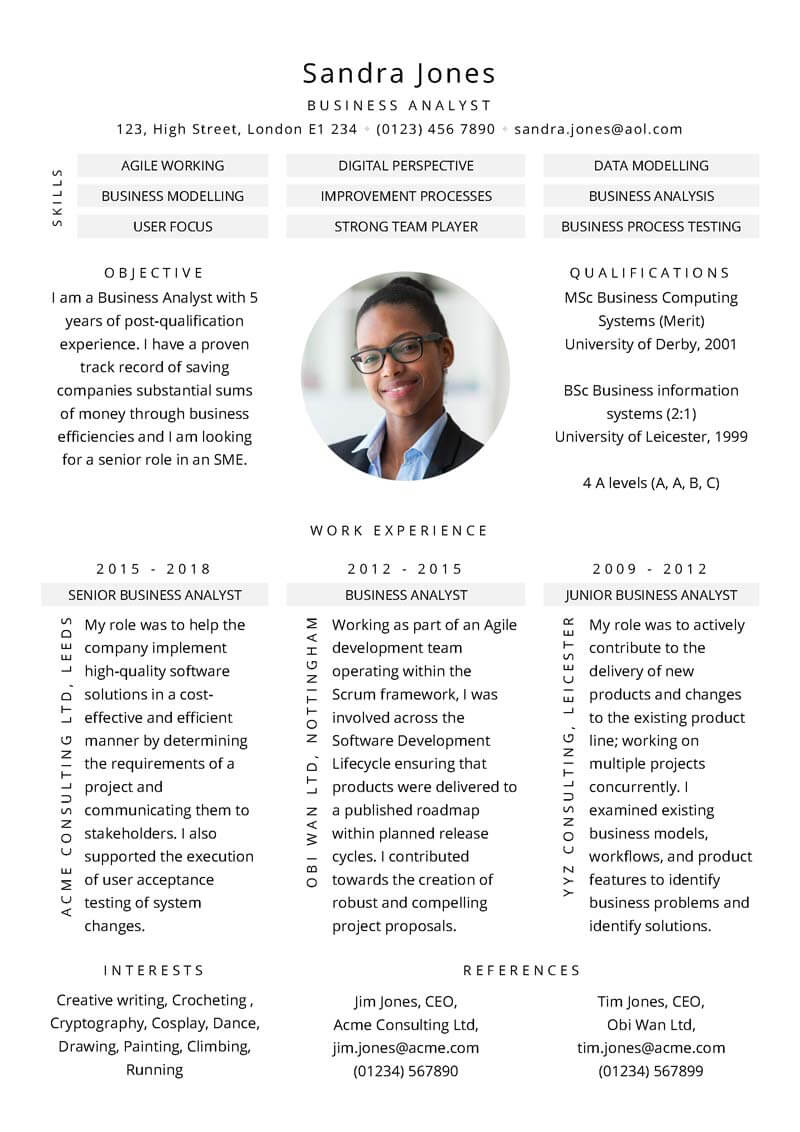
Above: Download this ‘Meet Me’ CV template here.
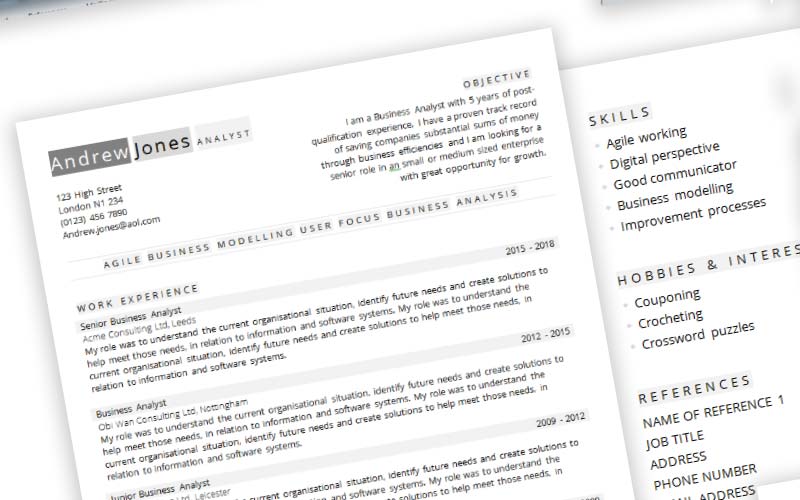
Above: Download this ‘Labels’ CV template here.
All of our CV templates can be easily customised to suit any role – see our CV template collection here.
